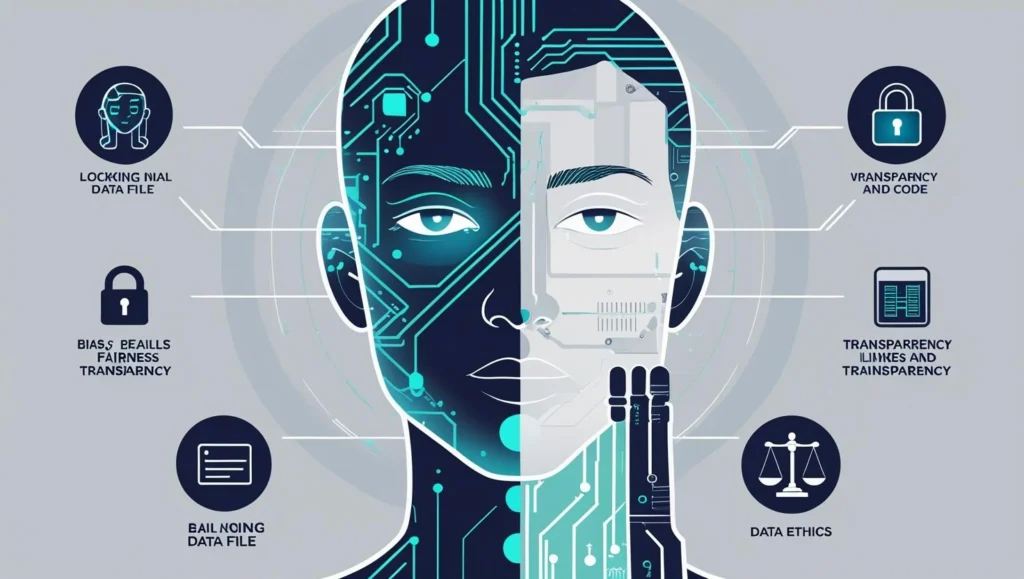Introduction
Ethical AI is no longer a niche concern—it’s a global imperative. As artificial intelligence continues to transform industries, from healthcare to finance and autonomous systems, rising concerns about AI bias, transparency, and fairness demand attention. Adopting an ethical AI approach means ensuring AI systems uphold values of accuracy, justice, and accountability worldwide.
In this age of rapid innovation, organizations must follow a clear roadmap for ethical AI & regulation. This journey includes defining core principles, applying ethical audits, buying ethics toolkits, adopting governance frameworks like UNESCO AI guidelines, and building inclusive, explainable AI systems. This article provides a structured, actionable roadmap to help developers, policymakers, and leaders implement truly responsible AI at a global scale.
Understanding Ethical AI and Its Challenges

Ethical AI means developing intelligent systems that respect human rights, minimize bias, and maintain transparency and accountability. It seeks to prevent harm—intentional or accidental—and to ensure equitable outcomes across all users.
However, achieving ethical AI presents complex hurdles:
- AI bias: Datasets often reflect systemic inequality, embedding unfair behavior in models.
- Lack of transparency: “Black-box” AI models can hide unfair decisions.
- Limited accountability: It’s often unclear who is responsible for AI-driven outcomes.
Despite these challenges, ethically-aligned AI is essential. Without it, AI adoption risks regulatory pushback, reputational harm, and societal harm—especially in sensitive domains like hiring, policing, and lending.
Roadmap for Ethical AI and Regulation
1. Define Ethical Principles & Governance
Start with universal principles like fairness, non-maleficence, transparency, and respect for human agency. Use frameworks from UNESCO AI and IEEE to shape your own ethics charter. Establish governance bodies—cross-functional ethics committees—to review AI projects at every stage.
2. Conduct Ethics Impact Assessments
Before development begins, perform assessments that include:
- Data bias audits
- Demographic, legal, and ethical impact predictions
- Public consultation, especially for sensitive AI use cases
These steps ensure responsible decision-making from the outset.
3. Integrate Ethics Tools
Buy ethics toolkits tailored for AI—such as Fairlearn, AI Fairness 360, and internal audit systems—to detect and correct bias and unfair outcomes early and continuously.
4. Use Explainable and Interpretable Models
Adopt explainable AI (XAI) techniques that make AI decisions visible to stakeholders. Methods like SHAP, LIME, and model cards help build trust and allow for transparent decision audit.
5. Ensure Human-in-the-Loop & Oversight
Combine AI with human judgment for high-stakes decisions. Provide clear escalation paths for override and appeal, especially in finance, law enforcement, or healthcare.
6. Hold Ongoing Monitoring & Audits
Ethical compliance is never complete. Use automated checkers and human audits to routinely test AI models for performance drift and bias, ensuring compliance with evolving standards.
7. Engage Stakeholders & Public
Promote public awareness by publishing model descriptions and releasing open datasets. Encourage collaborative innovation and enrich ethical AI frameworks with feedback across civil society and academia.
8. Align with Global Standards & Regulations
Adopt international regulations like:
- UNESCO’s recommendation on the Ethics of AI
- EU’s AI Act
- OECD AI Principles
Cross-border alignment helps avoid regulatory fragmentation and positions organizations as responsible global actors.Organizations looking to implement robust AI frameworks should consider building on UNESCO’s Recommendation on the Ethics of Artificial Intelligence, which outlines globally accepted principles for transparency, fairness, and human oversight news.sap.com+8unesco.org+8youtube.com+8.
Buying Ethics Toolkits: What to Know
Ethics toolkits are software packages designed to assess and mitigate AI bias, privacy concerns, and fairness issues:
Why Purchase One?
- They integrate directly into AI pipelines for early detection of fairness issues.
- They offer explainability components, human oversight support, and standardized auditing mechanisms.
How to Choose Wisely:
- Ensure compatibility with your tech stack (e.g., Python, TensorFlow, PyTorch).
- Choose frameworks aligned with targeted AI use cases.
- Look for tools with strong community support and documentation.
By investing in reputable ethics toolkits, organizations can ensure a proactive approach to responsible tech and meet their obligations on AI fairness.
What’s Ethical AI Roadmap? Best Practices
To enforce fairness and inclusiveness throughout the AI lifecycle, follow these guidelines:
- Bias Detection: Use quantitative metrics like demographic parity or equalized odds during training.
- Bias Mitigation: Apply pre-processing, in-processing, and post-processing techniques to reduce unfair outcomes.
- Transparency: Provide users with model documentation (model cards) and accessible explanations.
- Inclusiveness: Engage diverse users in development cycles to surface hidden biases.
- Data Ethics: Secure informed consent and anonymize personal data at all times.
Applying these ethical practices ensures that AI systems remain trustworthy, lawful, and aligned with human values as they scale globally.
Navigating AI Governance Toolkit and Resources
The AI Governance Toolkit provides a repeatable framework for implementing ethical AI:
- Risk frameworks to assess AI’s social and business risks
- Policy templates for data governance, procurement, and human oversight
- Compliance checklists aligned with existing laws and international ethics principles
Additional resources include UNESCO’s guidelines, IEEE’s publications, and open-source ethics frameworks listed by AI Now Institute and similar bodies.
Global Perspective and Future Outlook
Ethical AI is a global movement: policies in the EU, Canada, UK, China, and India are shaping global norms. Future trends include:
- Explainable AI (XAI) for accountability
- Human-centric AI prioritizing user well-being
- Joint multi-nation governance and public-private AI regulation efforts
This underscores the need for an inclusive, harmonized ethical roadmap in order to build trustworthy AI around the world.
For a deeper dive into AI-powered platforms and ride-sharing technology, explore our article on building scalable digital infrastructure: Roadmap to Build App Like Uber.
Conclusion
In the digital era, ethical AI isn’t optional—it’s foundational. Organizations embracing a clear roadmap for ethical AI & regulation are building robust systems that reflect social values and engender trust in global markets.
By defining governance, integrating toolkits, enforcing fairness, and involving stakeholders, developers and leaders can deliver AI responsibly. As standards evolve, continuous monitoring and gracious transparency ensure tech remains purposeful and aligned with humanity’s best interests.









